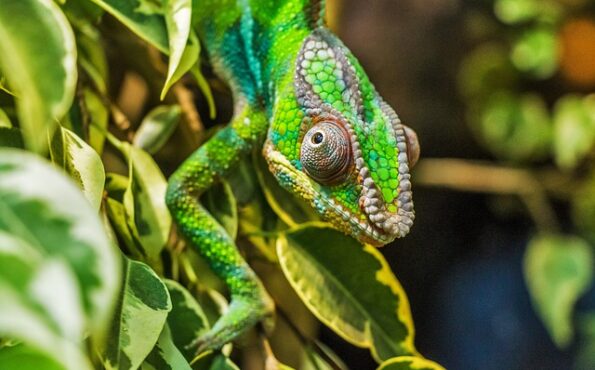Reptiles come in all shapes and sizes, and require lots of care and attention. The set up costs can far outweigh the cost of your pet and understanding how to care for your reptile is important. Whether you’re buying a bearded dragon, leopard gecko or a different kind of lizard, our article aims to offer you guidance.
Is your reptile insured? Get a quote for £1,000 of vet fee cover, death and theft cover for lizards and snakes. Or £2,500 of vet fee cover, death and theft cover, if you own a tortoise. Vet fee cover only also available | We’ve been insuring exotic pets since 1996 | Check out our customer reviews on Feefo.
Thanks to Sean McCormack BSc (Hons), MVB, MRCVS Exotic Pet Vet who gave us permission to use material from his webinar Reptile Housing and Husbandary.
Which Vivarium?
Clinical Vivarium Design: This is a minimalistic design for a vivarium, with very basic substrate and minimal furniture. Benefits are that it enables easier husbandary and observation. However, it is not typical of your reptiles ‘natural’ habitat. In some pet types, it can lead to stress. This kind of design can be more suitable for larger reptiles.
Naturalistic Vivarium Design: This vivarium is based on a design that is more ‘natural’ to your reptile’s habitat. Depending on your reptiles needs you can use mulch, soil, live plants, sand and insects within the vivarium. This creates an ‘eco-system’ helping to break down bacteria. This design will encourage natural behaviour such as burrowing and offers a range of microclimates that some reptiles such as leopard geckos need. Often with this kind of vivarium, you won’t need to clean it out very often, due to the ‘natural’ break down of bacteria. However, the presence of organics in the vivarium could also encourage pathogens and bacteria to grow. You should be aware of this.
Suitable substrate for your vivarium
You should avoid using loose substrate such as sand in your reptile’s vivarium, if your pet is likely to eat it. Sean advises that for example, bearded dragons are more at risk of eating their substrate. Eating substrate can cause impaction. As an alternative you can use tiles, lino or slate, however this may not be suitable if your lizard likes to burrow. If your lizard does attempt to eat its substrate, it can be a sign of a vitamin deficiency.
Is your reptile insured? Get a quote for £1,000 of vet fee cover, death and theft cover for lizards and snakes. Or £2,500 of vet fee cover, death and theft cover, if you own a tortoise. Vet fee cover only also available | We’ve been insuring exotic pets since 1996 | Check out our customer reviews on Feefo.
Reptile Heating
Reptiles are cold blooded animals which means that they cannot regulate their own body temperature. They rely on the external temperature to regulate their body temperature.
Heating requirements vary depending on your pet type. The correct heating is essential for immune function, digestion, enzyme production, hormone regulation, behaviour and medication effect.
Sean advises that your reptile’s vivarium should have a temperature gradient that allows for a warm and cool area. This enables your reptile to move to a cooler area, when it needs to.
There are a range of heat sources available. You should research carefully what is suitable for your reptile.
Finally, be conscious of the position of your vivarium. If it’s in a hot room, or if the sun shines directly onto it, the temperature inside it may change.
The correct lighting is very important for your reptile. There are various types of reptile lighting available, including UV lighting. This is designed to replicate the UVA & UVB light found in the sunlight. According to Exo –Terra, UVA light is significant for reptile vision and wellbeing and UVB helps with the production of vitamin D3, which is essential for calcium metabolism. A lack of calcium, can lead to conditions such as metabolic bone disease. It is essential that you research your reptile’s lighting requirements.
Be aware that:
- UV lighting declines over time – you should replace your bulb at least every 6 months
- UVA & UVB lighting cannot penetrate glass. Therefore you should ensure your reptile’s lamp is not obstructed by glass.
Humidity
Sean advises that the incorrect humidity levels can lead to problems with shedding, chronic renal failure, breathing problems and other health issues. It can also promote the growth of bacteria and fungi. You should ensure the humidity levels are suitable for your pet, and that a micro-climate is available if needed. Leopard geckos for example need a micro-climate. Leopard geckos naturally live in a dry environment, however, they shed in the humid environment found under rocks.
You should also ensure there’s ventilation within your vivarium, to promote airflow, and remove stagnant air.
Our reptile insurance can cover vet fees, death and theft. Get a quote
Alternatively you can call us on 0345 982 5505
Your reptile, illness (yes it can happen!) and insurance
The main reason pet owners buy pet insurance is to cover unexpected vet bills. Vet bills can be very expensive, and can cause a lot of distress for pet owners. With the introduction of more specialised equipment the kind of treatment you bird can receive has improved. This means they can get better more quickly, however, it does mean vet bills can be eye watering!
Recent claims that were paid by ExoticDirect include:
- £374 for a Leopard Gecko with impaction
- £434 for a Bearded Dragon suffering with parasites and requiring a tail amputation
- £368 for a Bearded Dragon suffering with stomatitis
ExoticDirect have been insuring exotic pets since 1996, so you’ll know you’re in good hands, and that they really know their stuff!
There are three different policy types available for both reptiles and tortoises, so you can choose the cover level that’s best for you. Furthermore premiums don’t change by pet breed, or by postcode. The only thing that affects the premium will be your pet’s value, and which level of vet fee cover the policy includes.
And finally…..
Prior to purchasing your pet, your should do plenty of research. Different reptiles have different requirements, and this includes diet. You should also ensure you register with an exotic pet vet as soon as possible, so that if your reptile becomes poorly, you can access appropriate medical care quickly.
Sean McCormack is a veterinary surgeon who works with domestic and exotic pets. He specialises in exotic pet care. Read more about Sean’s experiences in exotic pet care at his website. You can also follow Sean on Twitter.
Is your reptile insured? Get a quote for £1,000 of vet fee cover, death and theft cover for lizards and snakes. Or £2,500 of vet fee cover, death and theft cover, if you own a tortoise. Vet fee cover only also available | We’ve been insuring exotic pets since 1996 | Check out our customer reviews on Feefo.
Disclaimer
Should you follow any advice given on the ExoticDirect Petpage, you do so at your own risk. Advice given on the ExoticDirect webiste is not a substitute for professional advice. If you require professional advice, please consult a veterinary surgeon.

